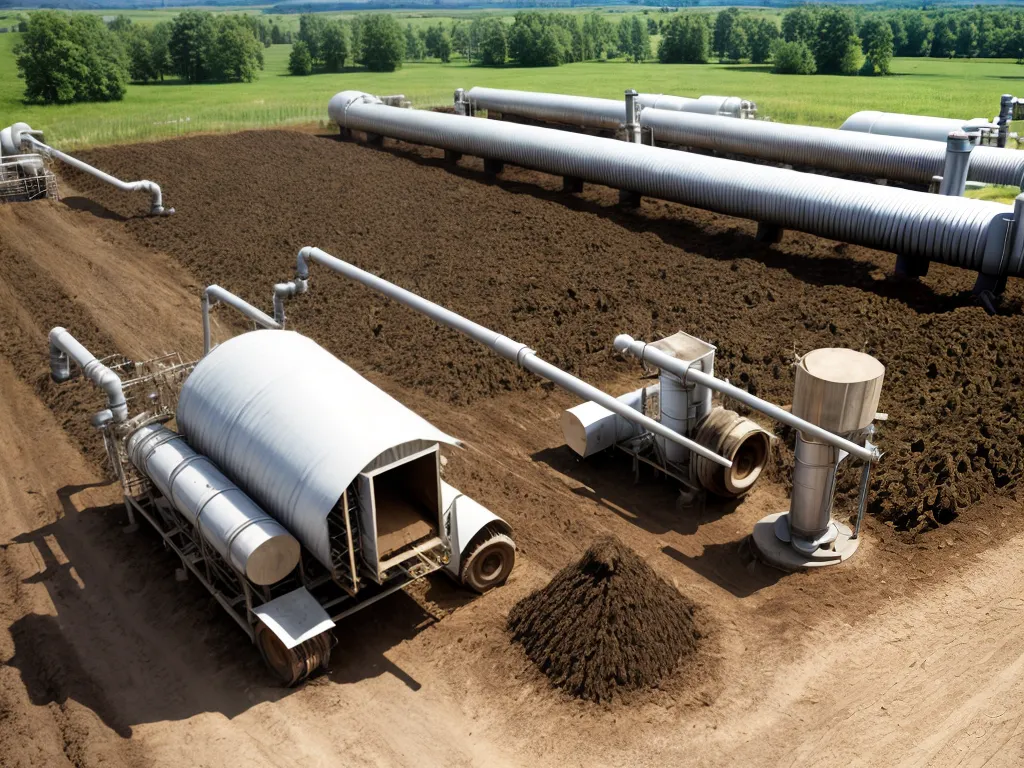
Manure is an excellent resource that can be used to produce renewable energy in a sustainable way. There are several methods to convert manure into usable energy like heat, electricity, or fuel. With careful planning and management, manure-based energy systems can provide environmental and economic benefits.
Collecting and Preparing the Manure
The first step is to collect manure from livestock operations like dairy farms or cattle feedlots. Raw manure has the highest energy potential before decomposition starts breaking down the organic matter.
- Cattle and swine manure generally have the highest energy contents.
- Poultry litter and horse manure have less potential.
- The best manure has a high ratio of volatile solids to total solids. This indicates a high amount of digestible organic compounds.
The manure should be analyzed to determine its solids content and energy value. Solids above 10-15% are optimal for energy production. Liquid manure can be used but may require concentration.
Cleaning and screening are important preparation steps:
- Remove contaminants like rocks, soil, and crop debris
- Break up clumps and smooth the texture
- Adjust water content if needed
Well-prepared manure has a uniform consistency for better handling and conversion.
Anaerobic Digestion into Biogas
Anaerobic digestion is a proven method to produce biogas from manure. Organic material is broken down by bacteria in oxygen-free tanks called digesters:
- The biogas is 60-70% methane with 30-40% CO2 and trace gases.
- Methane is the energy-rich component that can displace fossil fuels.
- Heat and electricity generation are the main biogas uses.
Key factors for optimal biogas production:
- Loading rate - Balance manure input to maintain bacterial health.
- Temperature - Mesophilic bacteria work best around 95°F (35°C).
- Retention time - Allow 20-40 days for full digestion.
- Mixing - Prevent sedimentation and scum formation.
Pre-treatment like thermal hydrolysis or ultrasonic pretreatment can improve biogas yields. Co-digesting manure with food waste also increases methane production.
Biogas Advantages
- Renewable energy from waste products.
- Reduces greenhouse gas emissions.
- Digestate byproduct is an organic fertilizer.
- Can be used in a generator, boiler, or co-fired in engines.
Thermochemical Conversion into Syngas
Heating manure above 700°F (370°C) under controlled oxygen drives thermochemical reactions that generate syngas:
- Primarily hydrogen and carbon monoxide.
- Can be combusted directly or catalytically upgraded to fuels.
- Gasification and pyrolysis are suitable thermochemical processes.
Syngas offers some benefits over biogas:
- Can flexibly produce heat, power, or liquid fuels.
- May have higher energy efficiency.
- Fast reaction rates under high temperature and pressure.
The high temperature requires dry manure generally below 15% moisture content. A two-stage process can be used to first dry and then convert the manure.
Thermochemical Considerations
- Tar formation can cause issues without proper gas conditioning.
- Ash disposal is necessary as inorganic minerals remain.
- Overall system is more complex than biogas.
Direct Combustion for Thermal Energy
Dried manure can be directly combusted in furnaces and boilers to produce hot air, steam or hot water:
- Suitable for heating agricultural facilities like greenhouses.
- Steam can run engines or generators for electricity.
- Lowest complexity method but less efficiency than gasification.
Manure should be dried to 85-90% solids to maximize heat production. Complete combustion requires temperatures reaching 1,600°F (870°C).
Key equipment for direct combustion systems:
- Manure dryer
- Feed hopper and conveyors
- Combustion chamber and stack
- Heat recovery unit
- Ash conveyor and collector
Integrated Approach for Maximum Value
An integrated manure energy system combines anaerobic digestion, gas upgrading, and ash/digestate utilization:
- Digester produces biogas converted to renewable natural gas (RNG).
- RNG displaces fossil natural gas - can be sold into pipelines.
- Ash contains phosphate used for fertilizer production.
- Digestate is composted into organic fertilizer.
This maximizes energy production while sustainably managing the byproducts.
Cooperative arrangements can provide shared digesters and processing facilities across multiple farms. Centralized systems benefit from economies of scale.
Government incentives like RNG feed-in tariffs and carbon credits can improve project economics. Manure energy helps farms contribute to renewable energy targets.
In summary, manure is a valuable energy resource when processed with proven technologies. Integrating digester biogas, syngas utilization, and nutrient recovery enables sustainable and profitable manure energy systems.